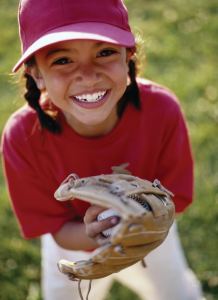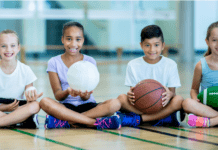If your kids are actively involved in competitive sports such as football or winter outdoor activities like snowboarding or skiing, there are important things you can do to keep them safe and lessen their risk of head injuries.
The University of Pittsburgh’s Neurological Surgery department reports that there are about 300,000 sports-related concussions per year and 21% of the traumatic brain injuries experienced by children in the U.S. are due to sports and recreational activities.

We at LearningRx Brain Training Center have compiled the top five myths about concussions and are providing easy steps parents can take to protect their children and keep safety top of mind:
MYTH #1: The two most dangerous high school sports—in terms of concussion rates—are football and hockey. Although high school football accounts for around 250,000 concussions each year, the second most dangerous sport isn’t hockey—it’s girls’ soccer. Other school sports known for their concussion rates include boys’ wrestling, girls’ basketball, boys’ ice hockey and boys’ lacrosse.
MYTH #2: The best predictor of post-injury symptom severity and neurocognitive deficits is a loss of consciousness.
On-the-field amnesia is actually the most predictive symptom; loss of consciousness occurs in fewer than 10 percent of concussions. General concussion symptoms to watch for after an injury include:
- Headache
- Confusion
- Lightheadedness or dizziness
- Convulsions or seizures
- Numbness or poor coordination in limbs
- Fatigue or lethargy
- Agitation or restlessness
Other symptoms include changes in sleep patterns, mood swings and behavior changes, and trouble with concentration, attention, and thinking.
MYTH #3: MRIs, CTs and EEGs are the most useful tools in identifying the effects of a concussion. These tests are not always useful in identifying the effects of a concussion. Concussions are usually metabolic rather than structural injuries. Observation of symptoms is probably the best and fastest way to diagnose a concussion on the spot and in the days immediately following an injury. A cognitive skills assessment is effective for determining if certain skills such as attention, working memory, and long-term memory have been affected.
MYTH #4: Other than rest, there’s nothing you can do to regain your brain skills after a concussion. If you know your child has cognitive changes due to a concussion, there are scientifically proven brain training programs that can help. Also known as “cognitive skills training,” intensive, one-on-one brain training forces the brain to grow more synapses (the pathways between neurons). By reorganizing how the brain relays signals between cells, you can strengthen the cognitive skills that were weakened by the injury.
MYTH #5: There’s nothing parents can do to protect their aspiring athlete from concussions or their effects. There are plenty of things that parents (and coaches) can do to help prevent concussions and reduce the damaging effects:
- Check the condition of your child’s protective gear (helmet shells and cages for football, lacrosse, and hockey), and make sure it fits properly.
- Take your athlete to a local brain training center for an initial cognitive skills assessment to provide a baseline to measure against results of future post-concussion tests.
- Encourage your school to create or enforce rules regarding concussions such as removing the athlete with a suspected head injury from the game or practice for the entire day. Ensure that your child’s coach is aware of and following these practices.
- Make sure the team’s athletic trainer has a cordless screwdriver on hand during games to remove a helmet’s facemask if there’s a possible spinal injury.
- Talk to your child about the risks associated with concussions—especially repeated head injuries. Explain how to identify the symptoms and discuss their option to sit out during practice or a game, even if the coach doesn’t require it.
Remember, while one concussion doesn’t typically do permanent damage, repeated concussions (especially in close succession) can. There can be immediate or delayed long-term neurological impairments in memory, problem solving, processing speed, planning, and attention.
It’s unrealistic to expect active youth to be 100% injury-free throughout their many practices and games. However, learning about prevention, symptom identification, and treatment can minimize the chance and severity of injuries. Keep safety top of mind and encourage them to have fun! For the most part, the benefits of participating in school sports will far outweigh the potential risks.
We’re excited to partner with LearningRx to giveaway a copy of the inspiring book “Vital Connections” by Michael Klassen and Karen Linamen telling the story about one man’s miraculous recovery from a traumatic brain injury. Additionally, Nashville Moms Blog readers who use the discount code “getsmarter” will receive 50% off a cognitive skills assessment at LearningRx (Nashville-Brentwood or Murfreesboro) now through December 31, 2014.
::WINNER:: Congratulations, Elissa! You’re the winner of “Vital Connections”! Look out for an email from us!
- GIVEAWAY CLOSES: Tuesday, December 9th at midnight
- NUMBER OF WINNERS: One
- PRIZE SHIPS: The United States
- DETAILS: The winner will be selected using random.org and announced next Tuesday as an update to this post as well as on Facebook and Twitter. That’s right—come right back here on Tuesday for the announcement of our winner.
Good luck!
:: TO ENTER ::
COMMENT on this post with what sports your kids play
FOLLOW @NashMomsBlog on Twitter (and comment below that you did with your Twitter handle)
FOLLOW @LearningRXTN05 on Twitter (and comment below that you did with your Twitter handle)
VISIT Nashville Moms Blog on Facebook (and comment below that you did)
VISIT LearningRx on Facebook (and comment below that you did)
FOLLOW Nashville Moms Blog on Instagram (and comment below that you did)
SUBSCRIBE to Nashville Moms Blog newsletter
Bridgette Butler is co-owner and director of LearningRx Nashville-Brentwood. LearningRx brain training specializes in treating the cause—not the symptoms—of learning struggles. Contact the Nashville-Brentwood center at 615-953-8899 or www.learningrx.com/nashville-brentwood or the Murfreesboro center at 615-867-8717 or www.learningrx.com/murfreesboro.


















No sports yet, but we’ve already ruled out football for our boys later in life. At least I say that now 😉
No sports right now, but we are looking into karate!
soccer here! And we are girls. But if we have boys I dread the day football or hockey comes. My hubby had so many injuries from football and pays for a few still. Great tips!
Gymnastics
Baseball all the way!